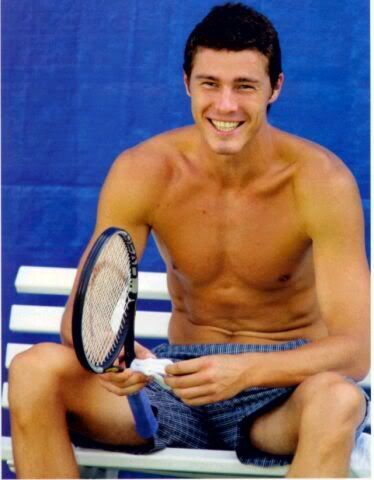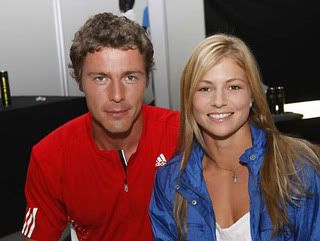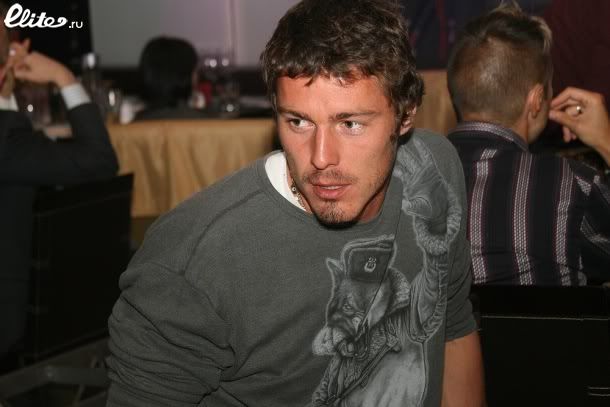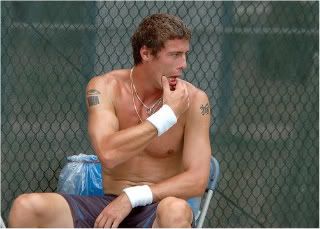Interview for the French Tennis Magazine, translated by Damita at MTF (thanks

)
He resurfaced where we expected him the less... Almost forgotten, the phoenix entered into the light during the last Wimbledon by joining the final fight after disturbing the trio which dominates tennis these days. Semi-finalist on the English grass (which is far from being his best surface), Marat Safin eliminated Novak Djokovic before giving in to Roger Federer. This "resurrection" didn't happen by chance and it was worth Tennis Magazine interviewing once again this still whimsical and endearing player that he is.
The temperamental Marat Safin, full of talent, tells us about his years of hardship and he doesn't mince his words when he speaks about the organisation of the tennis tour or about the pernicious aspect of some rules in the game. At the age of maturity, he has a clear view on himself, but becomes merciless for sermonizers. He can tease, he can even provoke when he uses a so not refined vocabulary, he can also show discretion when talking about his "little" sister Dinara and even show real admiration about the Nadal-Federer rivalry on top of the world's hierarchy.
One can sometimes forget that he, too, once was the world #1 and won 2 grand slam tournaments, the 2000 US Open and the 2005 Australian Open. He's not at the Olympics, where he could have potentially asked for a WC, and it's in the middle of his American summer that we've met him, for a straight conversation. Hold on tight, it really takes your breath away...
Tennis Magazine: You surprised a lot of people during the last Wimbledon, first by beating Novak Djokovic, and then by reaching the semi-finals. Did you surprise yourself as well?
Marat Safin: First of all, I don't care at all what people think of me or expect from me. I'm satisfied with the life and the career I have had so far. Because the people who have an opinion on me, they know nothing about tennis for most of them. And those who are into this sport and know about tennis, they know how difficult it is to come back after being injured, and how difficult it is to travel weeks after weeks on tour for already 10 years. So sure this semi-final was a surprise, but I deserved it. I worked hard for it. It's been a few years now that I've had trouble to move on court, because of my knee which was painful. It was hard, believe me. Then I started working with Gumy (1) to try reverse the situation, because I was going through difficult times, and I wasn't enjoying being on court anymore. It wasn't easy for him to make me change the way I was moving on court, and to make me become faster. We worked hard for that...
TM: You had a switchback career in general. Were there moments when you worked hard but results didn't follow?
MS: Again, you can't imagine how happy I am to be where I stand now. I don't care whether I'm 80th, 90th, or 150th. I was in the top 10, I was #1, I won 2 grand slam titles, when at the age of 16-17, when my sponsor dumped me, I really thought I'd never have the possibility to hit the tour. Finding money was an emergency, and I was lucky that IMG came to me...
TM: When was that?
MS: In 1997 (2). I even had to borrow money to go to Roland Garros. So when I hear people judging me, I think they'd better keep their opinions for themselves and cut me some slack. And there are a lot of them, especially people in the world of tennis who say "He should have done this or that", and when I hear that I want to be somewhere else. But in fact I don't care. When I look back, I think I've had a great life and an amazing career. I really did all I could do, so why should I regret anything? Trust me, I don't regret a thing.
TM: Tell us more about this moment at the beginning of your career when you had no money to travel.
MS: I was ranked 450th, and my sponsor told me they would provide no more financial help. So I went back to Moscow for 2 months, until that day when IMG offered me to go play the junior tournament in Roland Garros. My mom gave me her last $500 and told me: "Go, and make a good use of them". If she hadn't given me this money to buy the plane ticket, I wouldn't have been to Paris, that's as simple as that. But this, people can't see. They see me on tv and say: "ah, what a life he has this guy! He plays for one hour and a half only, and earns a lot of money". But they don't see how I work all year long, and the hard times I've been through during these last 10 years.
TM: These hard moments you've been through, do they make you appreciate your life on tour even more now?
MS: Of course. A lot of people think it's granted, and that, because you have some talent, it's enough to lead you to the top 10. But that's bullshit. You have to work a lot on court and off court to continue to improve, because the quality of the circuit never stopped to improve in 10 years. And I'm still there. Even when I lose 6 times in a row in the first round, I'm hanging there, I keep on spending hours and hours at the gym. I'm not doing it for money. I'm doing it because I still like tennis and I think I still have my word to say on tour. Right now I'm #38, but with one tournament I can enter the top 20. But even there, people would still find a way to criticize me and say I should have won this or that match, i should have won the 2002 Australian Open. They can take the racket and do it for me if they want to. But professional tennis is difficult, it's not a Playstation game.
TM: Do you enjoy yourself everytime you're on court?
MS: Of course not. You can not enjoy it every day. You can have a bad day because you had an argument with someone, or because you woke up grumpy. We're humans, not machines. Why did Federer lose to Karlovic in Cincinnati, or to Simon in Toronto? There are immediately people who came to the conclusion that he's time is over. No, why would it be over? Maybe the guy just has a bad moment, maybe he has private issues, we don't know. I'm just saying, one can't be at their best every day. It's easy to feel good when everything you try on court succeeds. But the day when you serve badly, when you have a little injury, when you don't 'feel' the ball well... it's different. But you have to hang in there, and wish the next day will be better.
TM: Tell us about Hernan Gumy, with whom you've been working since last year. It seems he brought a lot to your game.
MS: Yes, he's a great coach, very patient. Patience is actually one of his main qualities, because he can meticulously explain to you all the aspects of something you have to improve. The way he details the technique, the movement, the tactics, I appreciate it a lot. He knows tennis very well.
TM: Some coaches are good for some players but not for others. As far as you're concerned, what do you look for in a coach?
MS: He mustn't be a pain in the ass, with military methods. He mustn't tell me that I have to do things this or that way, that I have to be on court all day, etc. No, I want to work, but I also want to enjoy it. Daily routine kills me, and this is something Gumy understands very well, he knows how to vary our work sessions. Some days he's pushing me, and some days he slows down. Each day is different.
TM: Is your aversion for daily routine the reason why you had so many coaches in your career?
MS: Actually I didn't have much coaches. In fact, I had none for several years, and Volkov was sometimes travelling with me, as a friend. Gumy is only the 4th one. 4 coaches in 10 years, that's not many. Argentine and French players change every week! ( so true) For a long time I couldn't find someone to travel with me, someone who fitted me. Then Lundgren arrived. But because of the pain in my knee, at some point I didn't know if I could continue this career or not, I was suffering too much...
TM: Did you think about quitting?
MS: Yes, in 2006. Even doctors were telling me to stop, cuz it really hurt too much. So I thought I'd play until the end the end of the year, even with the pain, and then if things didn't get better I would quit. But I didn't want Peter (Lundgren) to be jobless if it happened, so I spoke to him frankly, and we decided it would be better for him that we splitted before. Then I started feeling better, and for some time I started travelling again with Volkov, to have a friend by my side. And now, my knee hasn't been hurting for a while. As Volkov couldn't travel any longer, Gumy came to me and I told him we should try workign together, without putting pressure on any of us. And it's working really well.
TM: As you wanted to quit 2 years ago, do you see things in a different way now? Do you think you have a second chance?
MS: It's another time now. I'm not 20 anymore you know. My personality is what it is, it's hard to change it now. I know what I like to do, and I know what I like less, that's it. And now I see things differently. I want to have fun, I don't want to put pressure on me, I don't want to worry for whatever reason. I have goals of course, but my philosophy is different now. I'm more experienced, I want to achieve things, I'm not saying the easy way, but let's say with less stress.
TM: What are the achievements you're the most proud of?
MS: First of all, I'd say winning the Australian Open on my 3rd attempt. Especially after losing the final in 2002. But I'm also proud of having being strong enough to win the US Open, which I really didn't expect. And I should have won Roland Garros in 2003, the year when I lost to Ferrero in the semi-finals. (hell yeah ) But anyway I managed to reach the semi-finals of all the Grand Slam tournaments, and not many guys did that (3). And the last one I reached at quite an advanced age, which isn't that bad. I also won 5 Masters Series, that's quite a lot in a career, no?
TM: That's true, but you forget a major event, the Davis Cup, that you won twice even. How do you explain that you've always done so well in this competition?
MS: The reason is that we have a great team. We can even make 2 completely different teams, and both would be strong enough to go quite far. And also in our team, we don't put a lot of pressure on each guy. We don't go out for dinner all together every evening, we don't spend all our time all together, we don't organize a gazillion staff meetings to discuss what we'll do the next day. There is no pressure. Youzhny goes out with his friends, Davydenko spends his time with his family, Tursunov goes out with some friends, Andreev with his, so do I. Other teams almost spend all of their time all together. I don't why, maybe because they like it this way. As for us, we organize our time so that we don't feel the pressure. If we want to play football together, we do. In fact, we don't even play doubles together the rest of the year.
TM: But you seem to always find the inspiration to play your best tennis, a lot more than for individual tournaments. Is the feeling that you're playing for your country the main reason?
MS: It's true that it's nice to feel that a whole team is showing support ebhind you. I like the atmosphere of these matches. It makes me feel good. And as I told you, I play with zero pressure, and that's what matters. When you don't feel much pressure, playing is easy.
TM: And you've already told how much you value Shamil Tarpishev, your captain.
MS: Yes, that's true, this guy knows what he's doing, he's smart, he doesn't put useless pressure on you when you're switching courtside, he's not speaking to you for 4 hours to tell you what you shall or shall not do on court. He only gives you one or two pieces of advice, then he helps you calm down a little when you're frustrated, and he cheers you up when you need it, he's doing his job, he's really an excellent captain. I see a lot of big names in tennis who became Davis Cup captains and who don't do 1/10 of the work he's doing. That's a proof you don't need to be a superstar to be a good captain. But that's someone intelligent, who knows to speak to each player in a different manner.(heard that, Forget? )
TM: Are you disappointed that you didn't take part in the Olympic Games in Beijing?
MS: Not really. I never played well at Olympic Games. I could have asked for a WC and I think I could have easily got one. But first of all Beijing is really far, and then the year schedule is really bad. Especially as we're going to Argentina for Davis Cup in September. No, really, the schedule was really badly made this year. Not only this year actually. Look after Bercy for example, we have one week off and then it's Shanghai (the Masters), then another week off, and then the final of Davis Cup. So, if we reach the final of Davis Cup, we have no time to rest. Common sense would have been to schedule the Davis Cup final the week after Shanghai. But now there are 3 weeks between Bercy and the Davis Cup final, then 4 weeks before the beginning of the next season. So we can't go on vacations, and our schedule really is tough. ATP should care about the problem because the way it is now isn't working.
TM: You attended the Olympic Games twice, and didn't have good results (4). Do you think the Olympics are as important as Grand Slam tournaments though, like some champions likes Federer said?
MS: To each his opinion. Look, Roddick didn't go there, neither did Fish... Of course it's great to play for Russia, but for us tennis players the top tournaments are the Grand Slam tournaments. Sure, it's an honor to play the Olympics, there's some atmosphere, but our priority remains the 4 Grand Slam tournaments, and it'll always be this way.
TM: Apart from the not so good results you had there, what do you remember of your 2 participations?
MS: Sydney was nice, but in Athens the organization wasn't good to be honest. I was expecting much better. The food wasn't very good, balls were horrible. It depressed me a little.
TM: Do you enjoy watching other sports?
MS: No, I don't follow any sport. Really none.
TM: So let's go back to Wimbledon, where Federer beat you in the semi-finals. Did you watch the final then?
MS: No. I don't like watching matches. I'm not really interested.
TM: Oh so you missed a historical final...
MS: Yeah, yeah, sure, that was a great final, but I wasn't tempted to watch it...
TM: What do you think of these 2 huge champions Federer and Nadal are?
MS: For sure they have something more than other players. Nadal is unbelievably athletic. He's fast. He gives you the feeling his hand movement isn't too good, but in fact his hand is exceptional. He's still improving, and he can play on all surfaces. As for Federer, he's got an amazing technique, and he moves perfectly. He can do everything with a ball, and that's what makes him so good to watch playing.
TM: You've been #1. What do you think when you see for how many weeks in a row Federer remained #1?
MS: He's at another level comparing to the other guys on tour. No doubt about this. To remain #1 for 4 years, and with such a gap with the other guys, is unbelievable. You really have to be special to achieve this. Because a lot of guys have been #1 at some point. Kafelnikov, Rafter, Hewitt, Moya or Kuerten all reached the #1 spot. But someone like Federer, we had never seen that. He has so many more options than other players, on his forehand, on his backhand, on serve... He sees the ball earlier than the others. He really deserved being on top for 4 years. He deserves to win a few more Grand Slam titles. We'll see if Nadal allows him to.
TM: Do you think he will?
MS: I have some doubts, but you never know. These last weeks he didn't play too well, but we don't know how he'll react. On the other side, Nadal is playing very well, Djokovic is hungry, Murray is doing miracles, he won Cincinnati for instance. It will be difficult then, for both of them. Because other players are hungry and want to beat them. Nowadays the guys give everything they have against him. Guys like Simon or Karlovic for instance, and it can make things complicated for him. But I still have faith in him. He can still bounce.
TM: How did you feel when you became #1?
MS: I didn't have the time to enjoy it. I injured myself not long after it. And because of the ATP stupid rules I couldn't stay #1 for too long. I injured myself in Dubai, and I was seeded #1 in Indian Wells and Miami so I had to play whatever it'd cost me, or my bonus would have been reduced to the minimum. And we're talking about a million and a half dollars here. For a 20 year old guy who is just starting to earn big amounts of money, that's quite a big sum. The rule said that for each Masters Series we didn't play at, we lost 30% of our bonus. So I played even if I had torn an intercostal muscle and I couldn't serve, and slipped to the 13th rank within only 5 months. So some would tell me "yeah but you should have stopped for a few weeks even though that would have cost you $1,5 million". That's easy to say, I wish I had seen these people make that choice for themselves. But I think I made the right choice, and after that it wasn't easy to come back. But I came back nonetheless, reached the #3 spot which isn't that bad, but in the meantime it cost me 5 months before I started feeling better.
TM: Let's talk about your sister Dinara, who reahed the final of Roland Garros. It must have been touching for you, even though you weren't there.
MS: She deserved it. She had a tough period at the beginning of the year, she lost in the first round of the Australian Open. Then she took the right decisions, which isn't an easy thing to do for a 22 year old girl. She stopped working with Heinz Günthardt and chose to travel with Zeljko Krajan, and it seems it is working since she lost only 2 matches in 5 months. She has so much confidence. I'm really, really happy for her, especially after the personal issues she had 2 years ago. Now she's one of the hottest players on the women's tour.
TM: Are you close?
MS: (hesitating) Yeah, I guess. Like a brother and a sister can be. We don't talk everyday but that's normal. She can text me one day and then not send me anything for 2 weeks. Right now for instance, I know she just won and that's great. I'm happy for her. And maybe she won't text me until I see her in New York, and that's fine, for her and for me.
TM: Did you think about going to Paris to support her?
MS: No, not really. She was playing well, I thought I'd better watch the final on tv, and not make a big fuss which would have put pressure on her. I would have been in the player's box, and they would have showed images of me on Eurosport and say "here, the brother is there with the whole family" which would have blow it up out of all proportion. No, she was doing a great job, and she had people around her to cheer her up, the mother, the father, the coach. It was enough, I'm cool with that, and so is she.
TM: You'll play the Hopman Cup together next January. That'll be a first.
MS: Yes, it'll be nice. We'll play mixed doubles together for the first time, and I think we'll have a great time.
TM: To conclude, how would you describe the man Marat Safin?
MS: Very tough character. Very stubborn. Impatient, in the good and the wrong sense... Maybe because I tend to be too much of a perfectionist and sometimes I'm too harsh with myself. But I think it helped my career. I have qualities and I have failings. Being impatient and being stubborn means that when I really want something, I'll have it no matter what. If I don't want to practice, I won't. If I have to be somewhere, I'll make sure I'm there if I'm convinced that it's important. And if I want something, I want it now. Not tomorrow, now. If I want a car, I want it now. If I want an apartment, same thing. I hate to wait. Sometimes on court impatience can be bad for you, but it can also help you to reach your goals.
--------------------------------------------------------
(1) Hernan Gumy is a former Argentine player who reached the 39th rank in the world in 1997. He's the coach of several players like Guillermo Cañas, Guillermo Coria, and for a short time of Gustavo Kuerten.
(2) That year, at the age of 17, Marat lost in the first round of the junior tournament against Brazilian player Alexandre Simoni.
(3) Other guys still playing who reached the semi-finals of all Grand slam tournaments are Roger Federer, Novak Djokovic, Rafael Nadal, and David Nalbandian.
(4) He lost in first round in 2000 against Fabrice Santoro, and in second round in 2004 against Feliciano Lopez.




 So, fingers crossed that I can see Marat on TV the 2nd week of US Open !!
So, fingers crossed that I can see Marat on TV the 2nd week of US Open !!












